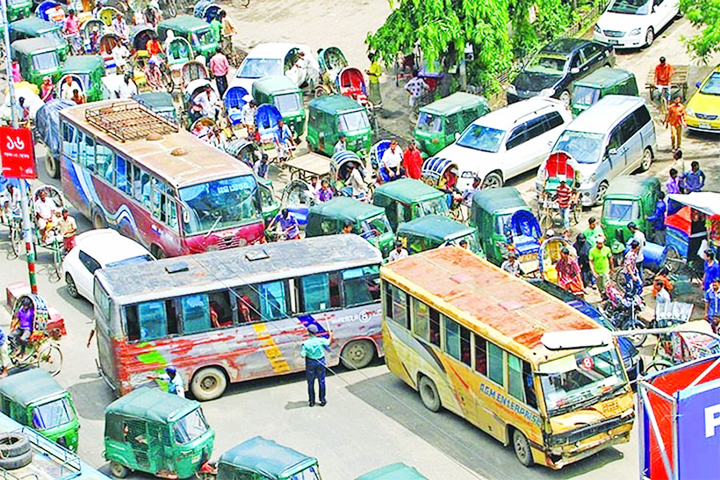Moving Roads: Paving the Way to a Sustainable, Traffic-Free Future

Dr. Sultan Ahmed & Kaynat Rahman :
Can you imagine Dhaka without traffic jams? A city, where your daily commute takes minutes instead of hours, where you breathe clean air without masks?
A moving road – an elevated, two-lane transit system that exclusively transports passengers, eliminating the need for a car, as the road carries individuals from one location to another – offers this groundbreaking future. Functioning with constant movement and quick station halts, this cutting-edge solution integrates solar energy, intelligent technology, and eco-friendly design to revolutionize urban transportation. In addition to addressing traffic issues, the moving road confronts urgent problems of air pollution, climate change, and economic setbacks while generating thousands of eco-friendly jobs. This innovative initiative can potentially transform Dhaka’s cityscape, providing a model for sustainable urban development globally.
Moving roads, paving the path to building a zero-traffic, jam-free, clean-air urban ecosystem. This revolutionary transportation system operates 10 feet above the ground with dual tracks moving in opposite directions. The transit systems run continuously, pause briefly at stations, and travel at a great speed.
Could it be true that the relentless gridlock in Dhaka is responsible for an economic loss of $6.5 billion annually? The city’s traffic problem, which affects the quality of life and hampers economic growth, is a problem for a metropolis of almost 20 million people. Moving roads can offer a solution by reducing congestion and enabling more efficient traffic flow. Moreover, these roads can provide a pioneering urban mobility alternative that encourages quicker and more sustainable travel for its residents.
Moving roads may significantly reduce emissions using environmentally friendly and energy-efficient transportation solutions. In 2023, 9% of Bangladesh’s transportation sector’s greenhouse gas emissions came from road transportation. On 5 January 2025, Dhaka received a concerning Air Quality Index (AQI) score of 493(Hazardous). The moving road system can improve air quality, lower the risk of respiratory illnesses, and enhance public health in general.
Moving roads could be essential in eliminating traditional car emissions, which might drop Dhaka’s particulate matter from 10.4% to nearly zero. This transit system could improve air quality and reduce reliance on fossil fuels by using renewable energy sources like solar power. Solar panels incorporated into the system’s infrastructure would produce clean electricity, offering a renewable energy source to power the moving road system and further lowering emissions.
With the use of moving roads, pollution may be completely eradicated. It will eventually save many more lives. According to studies, even a 20% decrease in pollution levels might save between 1,200 and 3,500 deaths a year and avert millions of respiratory illnesses. This renewable energy-powered transportation system could lower greenhouse gas emissions, and improve the lives of Dhaka’s residents.
Several cities and countries have implemented or explored moving roads and walkways to improve passenger transport and urban mobility. Dhaka proposes an elevated system to address traffic congestion and promote eco-friendly travel. Geneva models a car-free network of walkways capable of transporting 7,000 passengers per hour. Hong Kong’s Central-Mid-Levels escalators connect hilly areas, while Charles de Gaulle Airport in France uses walkways for seamless passenger flow. These systems enhance mobility, reduce congestion, and support sustainable urban transport.
Traffic congestion drains $11.4 billion yearly from our economy. Losing 5.3 million working hours daily is an unacceptable waste of productivity. Moving roads generate numerous employment opportunities in the areas of development, maintenance, and system operations. By reducing reliance on motor vehicles, these roads also promote convenience, physical activity, stress reduction, mental well-being, social interactions, and environmental sustainability.
For example, as of 2017, Bangladesh’s transportation and storage industry employed more than 5.2 million people, suggesting a solid basis for job growth in this sector. The workforce can be equipped for these new positions by implementing training programs on installing solar panels and integrating smart technology.
How much could possibly be saved while building a sustainable future in Dhaka? Because moving roads lowers the costs of traditional infrastructure, they provide a chance to spearhead the green revolution. The transit system also provides a chance to reduce land acquisition and related costs because of its raised design, in contrast to traditional highways, which cost between $55,000 and $100,000 per kilometer.
Moving roads offers a chance to incorporate green infrastructure into Dhaka’s development, addressing both urban growth and unemployment. Globally, the renewable energy sector is expected to generate 24 million employments by 2030. By promoting sustainable solutions, Dhaka may capitalize on this trend. Moving roads promote Dhaka’s transformation to greener urban surroundings and offers a chance to leverage local human resources, creating jobs.
Additionally, the moving roads would eliminate visual pollution by eliminating visually unappealing vehicles. By implementing the advanced transportation system, Dhaka may improve its economy and guarantee a cleaner, more sustainable future.
To sum up, Dhaka’s moving road idea is a ground-breaking way to alleviate the city’s terrible traffic, which costs $6.5 billion a year and consumes 8.2 million working hours per day. As vehicle speeds are now only 4.8 km/h, it is our joint responsibility to accept and put this cutting-edge technology into place. One of the most polluted cities in the world may greatly reduce pollutants and improve air quality by incorporating solar panels into the moving roads. Moreover, it has the potential to transform urban mobility, empower communities, and generate meaningful jobs. We all have to collaborate to take full advantage of this unique opportunity to make Dhaka a global leader in efficiency and sustainability.
(Authors: Dr. Sultan Ahmed is Associate Director at the Bangladesh Institute of Governance and Management (BIGM), former Secretary of the Power Division, former Chairman of Rajdhani Unnayan Kartripakkha (RAJUK), and former Director-General of the Department of Environment. Kaynat Rahman is a Research Associate at the Bangladesh Institute of Governance and Management (BIGM))
